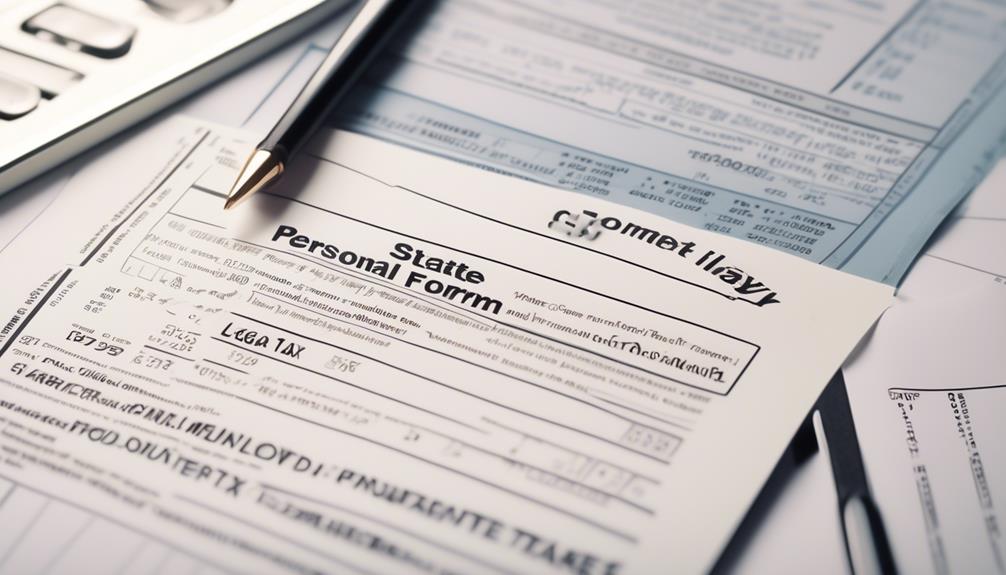Did you know that the tax implications of personal injury settlements in Georgia can significantly impact the amount you receive? Imagine finally reaching a settlement only to find out that unexpected tax liabilities eat into your compensation. It's like getting a smaller slice of the pie than you deserve.
At Metro Atlanta Law, we believe that individuals should know their rights and understand the legal process. That's why we partner with top personal and criminal attorneys in Georgia to ensure you have the information you need to make informed decisions.
Understanding the nuances of how personal injury settlements are taxed is crucial, just like knowing the ins and outs of a challenging maze. Navigating these tax implications can make a substantial difference in the final amount you receive.
So, grab your metaphorical flashlight, because we're about to shed light on the tax implications of personal injury settlements in Georgia.
Key Takeaways
- Are personal injury settlements in Georgia taxable?
- What are the tax implications of lost wages and other settlement components in Georgia?
- Are there exemptions from taxation for personal injury settlements in Georgia?
- What are the Georgia state income tax implications for personal injury settlements?
- How can legal assistance help navigate complex tax-related matters for personal injury settlements in Georgia?
- Personal injury settlements in Georgia may or may not be taxable, depending on the specific components of the settlement.
- The tax implications of lost wages and other settlement components in Georgia need to be carefully assessed and understood to avoid potential issues with the IRS.
- There may be exemptions from taxation for certain aspects of personal injury settlements in Georgia, which should be considered in consultation with a tax professional.
- Georgia state income tax implications for personal injury settlements should be taken into account when evaluating the overall tax liability.
- Seeking legal assistance can provide valuable support for navigating complex tax-related matters and understanding the rights and obligations associated with personal injury settlements in Georgia.
Taxability of Personal Injury Settlements

Hey there! When it comes to personal injury settlements in Georgia, it's essential to understand how they might affect your taxes. Let's break it down.
In Georgia, the tax implications of personal injury settlements are determined by state tax laws. Generally, these settlements aren't taxable because their purpose is to compensate for losses, not generate gains. However, there are some exceptions to be aware of.
For instance, emotional or psychological injuries without corresponding physical injuries, employment-based claims, and previously deducted physical injuries may be subject to taxation. Additionally, punitive damages and interest on settlements are taxable.
It's important to note that legal fees incurred in personal injury cases aren't deductible. Understanding these nuances in Georgia state tax law regarding personal injury settlements is crucial to ensure compliance and accurate reporting of any taxable portions of the settlement.
I hope this overview helps shed some light on the tax implications of personal injury settlements in Georgia! If you have any specific questions or need further assistance, feel free to reach out.
Exemptions From Taxation

When it comes to personal injury settlements in Georgia, it's important to understand the tax implications. Here's what you need to know to navigate the tax exemptions and taxable income related to personal injury settlements in Georgia.
First off, if you receive compensation for physical injuries or physical sickness, you can generally claim exemptions from taxation in Georgia. This means that settlements for physical injuries or physical sickness are typically non-taxable. So if you're involved in a traditional tort case, like a car accident or slip and fall, you can expect the resulting settlement to be non-taxable.
However, it's essential to note that emotional or psychological injuries without corresponding physical injuries don't qualify for tax exemptions in Georgia. This means that if your settlement is for emotional or psychological distress alone, it may be subject to taxation.
One more thing to keep in mind is that punitive damages received in a personal injury settlement are taxable according to IRS guidelines. So, if you receive punitive damages as part of your settlement, you'll need to report it as other income.
Understanding these distinctions can help you navigate the tax implications of personal injury settlements in Georgia. It's important to be aware of these rules to ensure you handle your settlement funds appropriately and avoid any unexpected tax obligations.
Taxation on Specific Settlement Components

When it comes to personal injury settlements, understanding the tax implications of each component is crucial to fulfilling your tax obligations. Let's break down the tax implications for different settlement components:
Physical Injuries:
If your settlement is for physical injuries, it's generally tax-free. This means you won't have to pay taxes on the amount you receive for your physical injuries.
Emotional Injuries:
If your emotional injuries involve lost wages, the portion of your settlement allocated for lost wages is taxable. It's important to keep this in mind when reporting your settlement for tax purposes.
Punitive Damages:
Punitive damages are taxable and should be reported as other income. This means you'll need to include them when reporting your income for tax purposes.
Legal Fees:
The legal fees you pay aren't deductible, which means the entire settlement amount is subject to taxation. It's essential to consider this when planning for your tax obligations.
Understanding the tax implications of each component is essential for accurate reporting and compliance with tax laws. If you're unsure about how these tax implications apply to your specific situation, it's always a good idea to consult with a tax professional for personalized guidance.
Georgia State Income Tax Implications

When it comes to personal injury settlements in Georgia, it's crucial to understand the state income tax implications. Here's what you need to know:
- Taxable Portions: Some parts of your personal injury settlement in Georgia may be taxable, but it all depends on the specifics of your case.
- Consultation: It's a good idea to talk to a personal injury attorney to get a clear understanding of how your settlement income might be taxed. The taxability of your settlement proceeds can be different for each case.
- Avoiding Issues: Knowing which parts of your settlement are taxable is important to steer clear of any problems with the IRS and to make sure you comply with Georgia state income tax laws.
- Clarity on Taxability: Certain parts of your settlement are usually taxable, while others mightn't be. It's important to get a clear picture of the tax implications for each component.
Understanding the tax implications of your personal injury settlement in Georgia will help you navigate the process more effectively and ensure that you comply with state income tax laws.
Legal Assistance for Tax-related Matters

When it comes to personal injury settlements, understanding the tax implications is crucial. That's why seeking legal assistance for tax-related matters is so important. A skilled tax professional can provide valuable guidance on the tax implications of different settlement components, such as compensation for medical expenses, lost wages, and pain and suffering. They can also offer insight into the deductibility of legal fees and help structure the settlement to minimize tax liabilities.
In Georgia, the taxability of personal injury settlements can vary based on the specific circumstances of the case. That's why having legal representation familiar with tax rules is essential. With their expertise, you can effectively evaluate your tax liability and navigate the intricate tax implications associated with personal injury settlements.
Conclusion
In the end, it's crucial to understand the tax implications of personal injury settlements in Georgia. Knowing your rights and navigating the legal process is essential to avoid potential issues with the IRS. It's important to consult with a tax professional to accurately assess the tax liability of lost wages and other settlement components. Exemptions from taxation and Georgia state income tax implications also need to be carefully considered. Legal assistance can provide valuable support for navigating complex tax-related matters.
So, remember, knowing your rights and understanding the legal process is key. If you're in Georgia and have questions about personal injury settlements, don't hesitate to reach out to Metro Atlanta Law for a free case evaluation. Understanding your rights and seeking legal guidance can make a significant difference in the outcome of your case.






